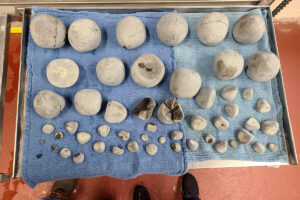Additional EEE, WNV Cases Confirmed in New Jersey Horses
The New Jersey Department of Agriculture Division of Animal Health issued a memo Oct. 6 confirming that additional horses in that state have tested positive for Eastern equine encephalitis (EEE) and West Nile virus (WNV).
The memo indicated that a 15-year-old unvaccinated mare from Cumberland County was the third confirmed positive EEE case in New Jersey horses in 2017; the mare was euthanized. Additionally, a 10-year-old unvaccinated stallion in Salem County is the second confirmed equine WNV in New Jersey this year. The stallion is currently being treated.
A viral disease, EEE affects the central nervous system and is transmitted to horses by infected mosquitoes. Clinical signs of EEE include moderate to high fever, depression, lack of appetite, cranial nerve deficits (facial paralysis, tongue weakness, difficulty swallowing), behavioral changes (aggression, self-mutilation, or drowsiness), gait abnormalities, or severe central nervous system signs, such as head-pressing, circling, blindness, and seizures. The course of EEE can be swift, with death occurring two to three days after onset of clinical signs despite intensive care; fatality rates reach 75-80% among horses. Horses that survive might have long-lasting impairments and neurologic problems.
West Nile is also transmitted to horses via bites from infected mosquitoes. Clinical signs for WNV include flulike signs, where the horse seems mildly anorexic and depressed; fine and coarse muscle and skin fasciculation; hyperesthesia (hypersensitivity to touch and sound); changes in mentation (mentality), when horses look like they are daydreaming or "just not with it"; occasional somnolence (drowsiness); propulsive walking (driving or pushing forward, often without control); and "spinal" signs, including asymmetrical weakness. Some horses show asymmetrical or symmetrical ataxia. There are no specific treatments for WNV, however supportive care can help horses recover in some cases. Equine mortality rate can be as high as 30-40%
Create a free account with TheHorse.com to view this content.
TheHorse.com is home to thousands of free articles about horse health care. In order to access some of our exclusive free content, you must be signed into TheHorse.com.
Start your free account today!
Already have an account?
and continue reading.

Related Articles
Stay on top of the most recent Horse Health news with

















